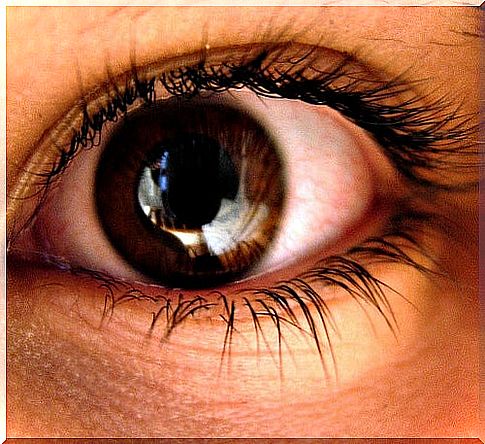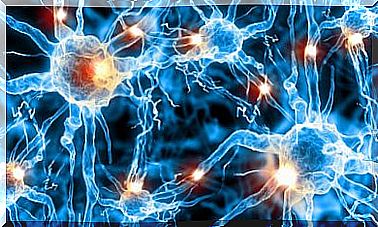6 Unknown Effects Of Anxiety On The Body
Besides the color of the head, the tremors in the body and the sweat in the hands, could you say what the unknown effects of anxiety are? Those that, although they are not so easy to notice with the naked eye, manifest themselves and cause discomfort.
Below we will reveal what they are and other information of interest that will help you better understand the importance of requesting professional help and take the first step to learn to better manage emotions.
The Unknown Effects of Anxiety on the Body
Anxiety can have various effects on the body. Some easier to notice with the naked eye than others, but all undoubtedly just as annoying for those who experience them.
1. dilated pupils

Having dilated pupils may be due (among other causes) to an alert state maintained over time. Therefore, it is included within the unknown effects of anxiety.
Pupillary dilation unrelated to low light sensitivity is a symptom of an underlying problem that needs to be known and treated.
When anxiety is very high, it is common to experience this unusual symptom that it can cause dizziness, see strange lights around or a reduction in visual quality.
It is necessary to understand that the purpose of anxiety is to protect us against a risk or threat. Therefore, one of the physiological reactions of the vegetative nervous system is pupillary dilation. This phenomenon has a very specific purpose: to be able to have a clearer and more extensive vision of what surrounds us in order to flee.
Likewise, within the Hamilton Anxiety Scale (1959), aimed at measuring the degree of this condition in the patient, one of the 15 indicators is pupil dilation.
2. Difficulty swallowing
Another unknown effect of anxiety is difficulty swallowing when eating, drinking, or even swallowing saliva. This condition is known as a ‘hysterical bolus’ or ‘lump in the throat’.
Aguirre Álvarez, Martínez Lemus and Núñez Orozco (2005) carried out a study where this condition is detailed and is included within somatoform disorders.
- This symptom is in turn related to dysphagia and is a clear somatization of anxiety. It is related to the glands responsible for producing saliva.
The main objective of the body is to reserve all the fluids to take care of the muscles, because they are the ones who should help us to run, to flee.
3. Headache

Anxiety will cause all the veins and arteries in the body to contract with a very specific purpose: to offer more blood to the muscles.
Therefore, circulation is more intense and favors vasoconstriction, which leads to the classic headache. This type of headache is usually more common in the early hours of the day and in the evenings.
Therefore, another of the unknown effects of anxiety is that intense headache that makes it difficult to perform various activities and even concentrate.
4. Pain in the jaw
There are certain areas of the body where anxiety and stress tend to accumulate to a greater degree. We speak, of course, of the neck, shoulders and back and jaw.
If you notice that jaw pain is more intense in the morning and that it even rises to your ears, it is most likely that you suffer from bruxism, that is, that at night you clench and grind your teeth due to stress and anxiety.
It is necessary to consult with the doctor, since, although a dental splint can help in these cases, the ideal is to work on treating the sources of anxiety to manage them properly.
5. Urinate more often than usual
One of the unknown effects of anxiety has to do with the number of times we can go to urinate in a short period of time.
In this sense, it is possible that we have all experienced it at some time: when facing an anxiety situation, such as an exam or a job interview, we go to the bathroom to urinate several times.
- It is a common fact, but at the same time curious because, when we suffer from anxiety, the kidney usually produces less urine. The reason? Save on liquids to offer them to the muscles.
- In turn, in the basic need to eliminate unnecessary weights to escape faster, the brain orders to go to the bathroom to eliminate urine, which makes us go so many times.
6. Feeling of ‘unreality’, one of the unknown effects of anxiety
This fact is strange, but those who have suffered a period of anxiety or very intense stress will know what we are talking about. It is when, suddenly, you have the clear feeling that what surrounds you is not real. It is like seeing the world from the outside and not feeling part of it.
For what is this? Well, we have to say, first of all, that if this phenomenon occurs often we should discuss it with the doctor.
- Intense anxiety affects the lungs.
- What we often do is breathe very fast and, when we accumulate too much oxygen, it is common to experience two things: the first is hyperventilation, and the second to feel a certain sense of unreality.
- The brain does not process this situation adequately and it is common to notice this uncomfortable sensation.
What to do when constantly suffering anxiety?
When anxiety is a constant in life, it is necessary to find solutions. To do this, talk to someone you trust and ask for help. In this way, you can begin to learn to better manage your emotions and thoughts, and most importantly: learn to live, despite the concerns that may arise.
Remember that, in addition to having an impact on a psychological level, anxiety can take a toll on physical health, in various aspects of which we are not always aware. Therefore, it is worth putting a solution to it and thus recover well-being.









